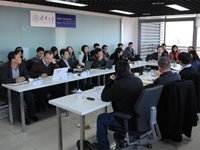Registration
You will receive an email confirming your registration.
IMGXYZ3283IMGZYXWith modern science and technology constantly evolving and with increased public participation in politics, significant changes have occurred in the relationship among the media, public opinion, and diplomacy. Media has an increasingly significant impact on diplomatic activities: public opinion has become an important factor in shaping the government’s policymaking and the media play an important role in guiding public opinion and exerting influence on foreign affairs. The Carnegie-Tsinghua Center for Global Policy invited several members of the media as well as academics engaged in research on public diplomacy to discuss the relationship among Chinese public opinion, the media, and Chinese foreign policy. This event was moderated by Carnegie-Tsinghua Resident Scholar Dr. Zhang Chuanjie.
Public Opinions
Like traditional media around the world, the Chinese media are not exempt from the pressures created by the ascendance of the so-called “new media,” including the Internet and social media.
- Citizen Journalism: The Internet, digital photography, blogging, and other forms of new media allow citizens to become correspondents, reporting on local as well as global events. According to Wang Kun from Sciences Po, the effects of this citizen journalism are largely positive, as the growing number of discussions allow for the creation of a better-informed public. Wang Kun acknowledged, however, that there does seem to be a correlation between such new media and an increase in popular nationalist sentiment.
- Increased Reporting: As the role of media is increasing, their impact on policymaking is changing. Reuters’ Chris Buckley suggested that the Chinese media have proven eager to report on issues that the government itself has not determined its policy on, especially when the media see such reporting as in China’s national interest.
- Media Credibility: Wang Kun and CCTV’s Tian Wei both expressed concern that in the wake of the rise of the so-called “new media,” the credibility of traditional media is decreasing.
Perception of Chinese Media Abroad
Even though freedom of the press is an issue for Westerners observing the Chinese media, the discussants agreed that Western democracies should show restraint when assessing the extent of censorship, given that this phenomenon is present in the West as well.
- Pressure and Reporting: It is a common misconception in the West that Chinese news agencies sometimes deliberately avoid reporting on sensitive issues, said Tian. Global Times’ Wang Wen added that Western media often face similar, if not always apparent, pressures from their governments. He said that Chinese media exert great effort to improve the freedom of information within the country.
- International Reputation: The Chinese media play an important role in shaping international perceptions of China. Foreign media often observe the Chinese media to assess the situation within the country. As an example, Xinhua News Agency’s Tang Lu described how Indian media often cite the remarks of Chinese media to emphasize Chinese nationalism and anti-Indian sentiment. Consequently, Chinese media must acknowledge the responsibility they share for the perception of China abroad.
Challenges
The challenges that Chinese media face are not, in fact, very different from the issues facing media in the West and in other developing countries, panelists agreed.
- International Reporting: Due to limited budgeting and resources, Zhang said, Chinese media agencies do not possess a strong foundation for reporting on international events. They are often forced to rely on reports from foreign media without confirming the accuracy of the information.
- Market Pressure: The need to keep viewers and sponsors creates pressure on media agencies to cater to the majority opinion. Sponsorship and advertisement revenue are crucial for Chinese media, and Wang Yang and Wang Wen agreed that these factors play too large of a role in shaping programming and editorial content.
According to the panel, the Chinese media moving forward should emphasize quality of information to better serve the public interest, while at the same time fend off pressure from interest groups.
